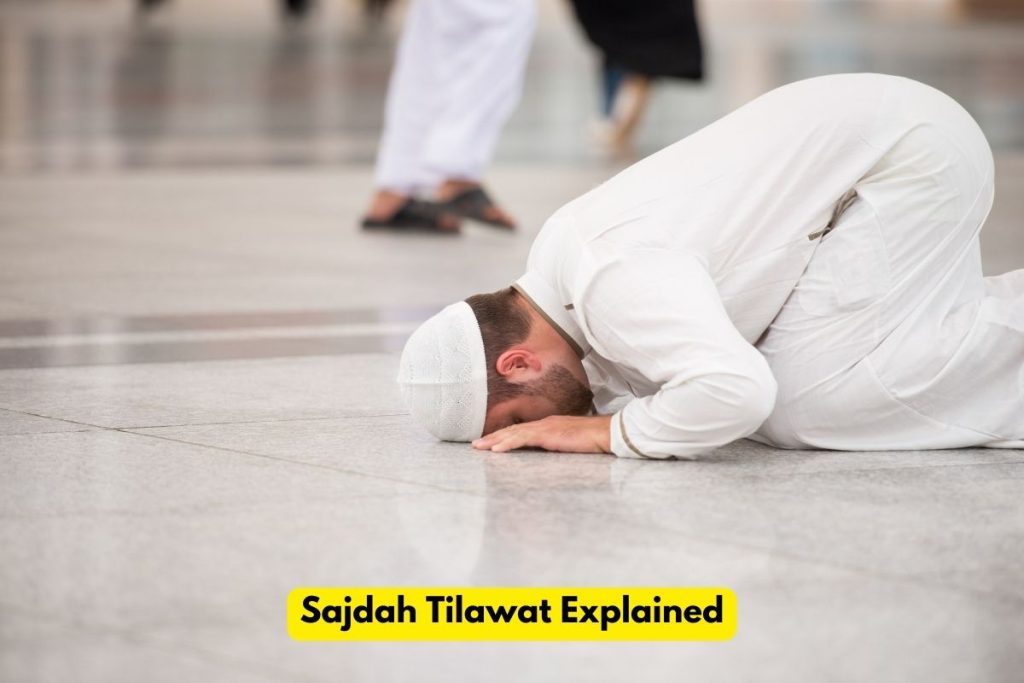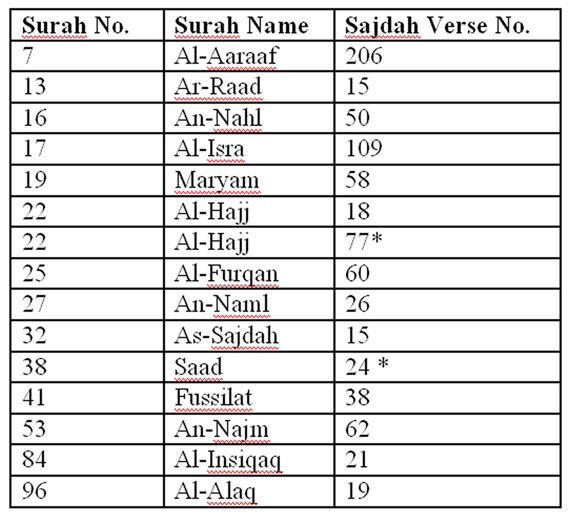That was a great explanation of Sajdah in the Quran. Let me put it in my own words:
Number of Sajdah: You are right; Sajdah has to be performed for 15 verses in the Holy Quran. These verses are also referred to as verses of Sajdah, Ayah as-Sajdah.
How to Perform Sajdah: At the reception of a verse of Sajdah, Muslims go into prostration, as they do during prayer. It depicts humbleness, subordination in front of Allah.
Hadith on Importance: The Hadith which you mentioned gives importance to Sajdah. It indicates that to prostrate means to obey and get the blessings of Allah, whereas Satan was disobedient.
Obligation of Sajdah: As for the ruling of performing Sajdah during Quran recitation, there is a difference among Islamic scholars. To some, like the one you have mentioned, it is obligatory (wajib), but many of them consider this act as highly recommended (mustahab).
Timing of Sajdah: You said it right; the prostration can be done immediately after coming upon the verse or later at a convenient point. What is important is not to forget it altogether.
Finding Sajdah Verses: To facilitate that, it will be good to have a Quran in which such verses have markings or keep separately a list of the verses of Sajdah. A number of resources online and on Islamic apps will help locate them.
Should I name the 15 Sajdah verses, or probably you will look for them through some resources?
Certain indications and methods have been prescribed by different schools of thought in Islamic jurisprudence to identify the Sajda (prostration) in the Quran. Following are the methods according to various schools of thought:

Places of prostration in the Quran
Surah Al-A’raf (7:206)
English: “Indeed, those who are near your Lord are not prevented by arrogance from His worship, and they exalt Him, and to Him they prostrate.”
Arabic: “إِنَّ الَّذِينَ عِندَ رَبِّكَ لَا يَسْتَكْبِرُونَ عَنْ عِبَادَتِهِ وَيُسَبِّحُونَهُ وَلَهُ يَسْجُدُونَ”
Surah Ar-Ra’d (13:15)
And to Allah prostrates whoever is within the heavens and the earth, willingly or by compulsion, and their shadows [as well] in the mornings and the afternoons.”
Arabic: “وَلِلَّهِ يَسْجُدُ مَن فِي السَّمَاوَاتِ وَالْأَرْضِ طَوْعًا وَكَرْهًا وَظِلَالُهُم بِالْغُدُوِّ وَالْآصَالِ”
Surah An-Nahl
They fear their Lord above them, and they do what they are commanded.
Arabic: “يَخَافُونَ رَبَّهُم مِّن فَوْقِهِمْ وَيَفْعَلُونَ مَا يُؤْمَرُونَ”
Surah Bani Israel
And they fall upon their faces weeping, and the Qur’an increases them in humble submission.”
Arabic:, Wa yakhirroona lil-athqani yabkoona wa yazeeduhum khushooAA
Surah Maryam (19:58)
Those were the ones upon whom Allaah bestowed favour from among the prophets of the descendents of Adam and of those We carried [in the ship] with Nooh, and of the descendents of Ibraaheem and Israa’eel and of those whom We guided and chose. When the verses of The Most Merciful were recited unto them they fell down prostrating and weeping.”
Arabic: “أُولَٰئِكَ الَّذِينَ أَنْعَمَ اللَّهُ عَلَيْهِم مِّنَ النَّبِيِّينَ مِن ذُرِّيَّةِ آدَمَ وَمِمَّنْ حَمَلْنَا مَعَ نُوحٍ وَمِن ذُرِّيَّةِ إِبْرَاهِيمَ وَإِسْرَائِيلَ وَمِمَّنْ هَدَيْنَا وَاجْتَبَيْنَا ۚ إِذَا تُتْلَىٰ عَلَيْهِمْ آيَاتُ الرَّحْمَٰنِ خَرُّوا سُجَّدًا وَبُكِيًّا” Surah Al-Hajj (22:18)
Do you not consider that to Allah prostrates whoever is in the heavens and whoever is on the earth and the sun, the moon, the stars, the mountains, the trees, the moving creatures and many of the people? But upon many the punishment has been justified. And he whom Allah humiliates – for him there is no bestower of honor. Indeed, Allah does what He wills.”
Arabic: “أَلَمْ تَرَ أَنَّ اللَّهَ يَسْجُدُ لَهُ مَن فِي السَّمَاوَاتِ وَمَن فِي الْأَرْضِ وَالشَّمْسُ وَالْقَمَرُ وَالنُّجُومُ وَالْجِبَالُ وَالشَّجَرُ وَالدَّوَابُّ وَكَثِير
What Are the Three Types of Sajdah?

The Sajda verses of the Quran can be divided into two types:
One where Allah informs about the prostration of His creation both general and particular and the second as mentioned in the Quran where the reciter and the listener are encouraged and it is a Sunnah to act like these Sajdas.
The second category includes verses where Allah orders His creation to prostrate to Him. In that regard, Muslims are obligated to adhere immediately to the order of their Lord to perform the prostration.
These are the two major categories of Sajda verses that exist in the Quran; each holds its importance and consequence for the believers.
Hanafi School:
If the reciter is prayerful, then he must have an intention for prostration.
One can prostrate immediately after the verse of Sajdah is recited, or after that verse is completed.
If there is more than one verse of Sajdah in a single prayer, then a single prostration is what is required.
If Sajdah is outside of Salat, then saying the takbeer before and when raising the head from the prostration is required.
HANBALI
There is to be two takbeers for the Sajdah whether it be within the prayer or outside of it.
First Takbeer is said before prostration, and the second one after having risen from prostration.
If the Sajda is outside the prayer, then it is like the Hanafi School but adding “Assalamu Alaikum” is added as an obligatory salutation.
Shafi’i School
He has to formulate the intention of prostration followed by saying Takbeer,
It is permissible to raise hands for takbeer.
Then the reciter goes down for prostration and after that says Takberrat Tasmee’.
If it is outside the prayer, the Sajda would also be preceded by all those steps and followed by the salutation.
Maliki School:
The ruling is that he says Takbeer before going down into the prostration and he may raise his hands outside of the prayer.
Then the reciter goes down for prostration with the intention.
Then, upon rising from the prostration he says another Takberrat Tasmee’.
While in the Hanafi School, there is one particular surrendering to the Sajda according to their method, in the Maliki School, there is no such surrendering.
For the number of Sajda verses in the Quran, nearly all of the scholars believe that there are fourteen such verses. However, the Maliki School considers it eleven.
Which para has Sajda in Quran?
| No. | Part No. | Surah | Verse No. | Verse | Translation |
|---|---|---|---|---|---|
| 3 | 14 | 16. Al-Nahl | 50 | يَخَافُونَ رَبَّهُم مِّن فَوْقِهِمْ وَيَفْعَلُونَ مَا يُؤْمَرُونَ ۩ ٥٠ | They1 fear their Lord above them, and do whatever they are commanded. |
| 4 | 15 | 17. Al-Isra | 109 | وَيَخِرُّونَ لِلْأَذْقَانِ يَبْكُونَ وَيَزِيدُهُمْ خُشُوعًۭا ۩ ١٠٩ | And they fall down upon their faces weeping, and it increases them in humility. |
| 5 | 16 | 19. Maryam | 58 | أُو۟لَـٰٓئِكَ ٱلَّذِينَ أَنْعَمَ ٱللَّهُ عَلَيْهِم مِّنَ ٱلنَّبِيِّـۧنَ مِن ذُرِّيَّةِ ءَادَمَ وَمِمَّنْ حَمَلْنَا مَعَ نُوحٍۢ وَمِن ذُرِّيَّةِ إِبْرَٰهِيمَ وَإِسْرَٰٓءِيلَ وَمِمَّنْ هَدَيْنَا وَٱجْتَبَيْنَآ ۚ إِذَا تُتْلَىٰ عَلَيْهِمْ ءَايَـٰتُ ٱلرَّحْمَـٰنِ خَرُّوا۟ سُجَّدًۭا وَبُكِيًّۭا ۩ ٥٨ | Those were ˹some of˺ the prophets who Allah has blessed from among the descendants of Adam, and of those We carried with Noah ˹in the Ark˺, and of the descendants of Abraham and Israel,1 and of those We ˹rightly˺ guided and chose. Whenever the revelations of the Most Compass |
| 6 | 17 | 22. Al-Hajj | 18 | أَلَمْ تَرَ أَنَّ ٱللَّهَ يَسْجُدُ لَهُۥ مَن فِى ٱلسَّمَـٰوَٰتِ وَمَن فِى ٱلْأَرْضِ وَٱلشَّمْسُ وَٱلْقَمَرُ وَٱلنُّجُومُ وَٱلْجِبَالُ وَٱلشَّجَرُ وَٱلدَّوَآبُّ وَكَثِيرٌۭ مِّنَ ٱلنَّاسِ ۖ وَكَثِيرٌ حَقَّ عَلَيْهِ ٱلْعَذَابُ ۗ وَمَن يُهِنِ ٱللَّهُ فَمَا لَهُۥ مِن مُّكْرِمٍ ۚ إِنَّ ٱللَّهَ يَفْعَلُ مَا يَشَآءُ ۩ ١٨ | Do you not see that to Allah bow down ˹in submission˺1 all those in the heavens and all those on the earth, as well as the sun, the moon, the stars, the mountains, the trees, and ˹all˺ living beings, as well as many humans, while many are deserving of punishment. And whoever Allah disgraces, none can honour. Surely Allah does what He wills. |
| 7 | 17 | 22. Al-Hajj | 77 | يَـٰٓأَيُّهَا ٱلَّذِينَ ءَامَنُوا۟ ٱرْكَعُوا۟ وَٱسْجُدُوا۟ وَٱعْبُدُوا۟ رَبَّكُمْ وَٱفْعَلُوا۟ ٱلْخَيْرَ لَعَلَّكُمْ تُفْلِحُونَ ۩ ٧٧ | O believers! Bow down, prostrate yourselves, worship your Lord, and do ˹what is˺ good so that you may be successful. |
| 8 | 19 | 25. Al-Furqan | 60 | وَإِذَا قِيلَ لَهُمُ ٱسْجُدُوا۟ لِلرَّحْمَـٰنِ قَالُوا۟ وَمَا ٱلرَّحْمَـٰنُ أَنَسْجُدُ لِمَا تَأْمُرُنَا وَزَادَهُمْ نُفُورًۭا ۩ ٦٠ | When it is said to them, “Prostrate to the Most Compassionate,” they ask ˹in disgust˺, “What is ‘the Most Compassionate’? Will we prostrate to whatever you order us to?” And it only drives them farther away. |
| 9 | 19 | 27. An-Naml | 26 | ٱللَّهُ لَآ إِلَـٰهَ إِلَّا هُوَ رَبُّ ٱلْعَرْشِ ٱلْعَظِيمِ ۩ ٢٦ | ˹He is˺ Allah! There is no god ˹worthy of worship˺ except Him, the Lord of the Mighty Throne.” |
| 10 | 21 | 32. As-Sajdah | 15 | إِنَّمَا يُؤْمِنُ بِـَٔايَـٰتِنَا ٱلَّذِينَ إِذَا ذُكِّرُوا۟ بِهَا خَرُّوا۟ سُجَّدًۭا وَسَبَّحُوا۟ بِحَمْدِ رَبِّهِمْ وَهُمْ لَا يَسْتَكْبِرُونَ ۩ ١٥ | The only ˹true˺ believers in Our revelation are those who—when it is recited to them—fall into prostration and glorify the praises of their Lord and are not too proud. |
| 11 | 23 | 38. Sad | 24 | قَالَ لَقَدْ ظَلَمَكَ بِسُؤَالِ نَعْجَتِكَ إِلَىٰ نِعَاجِهِۦ ۖ وَإِنَّ كَثِيرًۭا مِّنَ ٱلْخُلَطَآءِ لَيَبْغِى بَعْضُهُمْ عَلَىٰ بَعْضٍ إِلَّا ٱلَّذِينَ ءَامَنُوا۟ وَعَمِلُوا۟ ٱلصَّـٰلِحَـٰتِ وَقَلِيلٌۭ مَّا هُمْ ۗ وَظَنَّ دَاوُۥدُ أَنَّمَا فَتَنَّـٰهُ فَٱسْتَغْفَرَ رَبَّهُۥ وَخَرَّ رَاكِعًۭا وَأَنَابَ ۩ ٢٤ | David ˹eventually˺ ruled, “He has definitely wronged you in demanding ˹to add˺ your sheep to his. And certainly many partners wrong each other, except those who believe and do good—but how few are they!” Then David realized that We had tested him so he asked for his Lord’s forgiveness, fell down in prostration, and turned ˹to Him in repentance˺. |
| 12 | 24 | 41. Fussilat | 38 | فَإِنِ ٱسْتَكْبَرُوا۟ فَٱلَّذِينَ عِندَ رَبِّكَ يُسَبِّحُونَ لَهُۥ بِٱلَّيْلِ وَٱلنَّهَارِ وَهُمْ لَا يَسْـَٔمُونَ ۩ ٣٨ | But if the pagans are too proud, then ˹let them know that˺ those ˹angels˺ nearest to your Lord glorify Him day and night, and never grow weary. |
| 13 | 27 | 53. An Najm | 62 | فَٱسْجُدُوا۟ لِلَّهِ وَٱعْبُدُوا۟ ۩ ٦٢ | Instead, prostrate to Allah and worship ˹Him alone˺! |
| 14 | 30 | 84. Inshiqaq | 21 | وَإِذَا قُرِئَ عَلَيْهِمُ ٱلْقُرْءَانُ لَا يَسْجُدُونَ ۩ ٢١ | and when the Quran is recited to them, they do not bow down ˹in submission˺?1 |
| 15 | 30 | 96. Al-Alaq | 19 | كَلَّا لَا تُطِعْهُ وَٱسْجُدْ وَٱقْتَرِب ۩ ١٩ | Again, no! Never obey him ˹O Prophet˺! Rather, ˹continue to˺ prostrate and draw near ˹to Allah˺. |
Surah Al-A’raf (7:206)
Surah Ar-Ra’d (13:15)
Surah An-Nahl (16:49)
Surah Al-Isra (17:107-109)
Surah Maryam (19:58)
Surah Al-Hajj (22:18)
Surah Al-Hajj (22:77)
Surah Al-Furqan (25:60)
Surah An-Naml (27:26)
Surah As-Sajdah (32:15)
Surah Sad (38:24)
Surah Fussilat (41:38)
Surah An-Najm (53:62)
Surah Al-Alaq (96:19)
These verses are significant reminders of Allah’s greatness and require believers to express their humility and submission through prostration.

How is sajda referenced in the Quran?
Islamic teachings emphasize that one must prostrate when the Holy Quran is recited, an obligation known as Sajdah Tilawat. The importance of performing it has been explained through a Hadith related by Abu Huraira, RA: he quotes the Prophet Muhammad, peace be upon him, as having said that when Sajdah is done, all the evil forces or shayateen move away from the performer of the Sajdah.
Identifying the Points of Sajdah Tilawat in the Holy Quran is very important. Typically, to indicate these points, specific signs are used or written words are provided, such as the sign “۩” or words “السجدہ” or “سجدہ”.
While performing Sajdah Tilawat, one has to stand up straight, say “Allahu Akbar,” go down into prostration on the knees but without raising the hands as in Salah, one must say “Subhaana Rabbiyal-A’laa” at least three times or any other odd number more than three, then say “Allahu Akbar” and then raise the head to complete the prostration.
Sajdah Tilawat becomes obligatory upon the one reciting the holy Quran as well as upon the one who is listening to it, at that particular moment when the respective verses are being recited. Whatever the posture or engagement, this obligation becomes due.
Indeed, there are fourteen such verses in the Quran, called Ayat of prostration, which one reads with deep respect and over which one subsequently prostrates. “These verses remind one of Allah’s greatness and one prostrates to Allah as an expression of devotion and submission.”.
Knowing the concept of Sajdah and Sajdah Tilawat, knowing how to do it, and realizing the verses in the Quran that call for prostration are just but essential aspects of practicing Islam with sincerity and devotion.

AoA, my name is Abd al-Rahman, and my vision is to spread the knowledge of the Quran to everyone. I am proud and tall while standing as your trusted mentor on the journey of learning and memorizing the Holy Quran. I, along with a committed team of Islamic teachers, am bound to provide an easy online facility for Islamic studies and Hifz programs.
